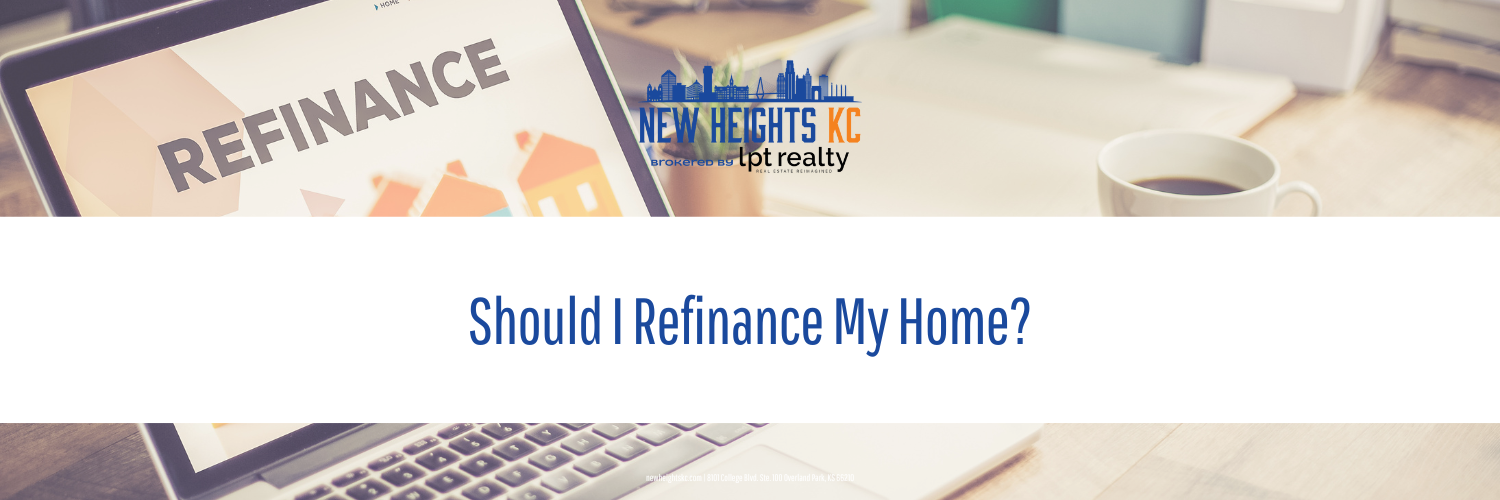Should I Refinance My Home?

Refinancing your home can be an incredibly effective way to save money, especially for homeowners who purchased a property within the last three years when mortgage interest rates were significantly higher. In recent years, many homebuyers locked in rates near 8% or even 8.5%, which now seem considerably high compared to the current market rates. But is it still worth refinancing, even if you could save just half a percent or so? Let’s dive into the world of refinancing and see how you can potentially benefit from this option—even with what might seem like a small rate reduction.
If you're considering refinancing, this post will walk you through the pros and cons, the key benefits, and provide you with real-life examples to help you make an informed decision.
What is Home Refinancing?
Home refinancing involves replacing your current mortgage with a new one, often with better terms. This typically means securing a lower interest rate, changing the length of the loan, or tapping into your home’s equity. Refinancing can offer several advantages, such as:
- Lower monthly payments due to a lower interest rate
- Changing the loan term for a shorter or longer period
- Cash-out refinancing to tap into your home’s equity
- Switching from an adjustable-rate mortgage (ARM) to a fixed-rate mortgage for stability
Why Should I Refinance Now?
If you bought a home in the last three years when interest rates were hovering near 8% to 8.5%, refinancing now could be a smart move—especially since rates have dropped significantly in recent months. For homeowners looking to save on their monthly payments, refinancing might still be worth it, even if the savings seem modest at first glance.
Let’s look at why refinancing now could be beneficial, even if the rate reduction is only half a percent or so. It’s important to remember that even small savings can add up over time.
1. Taking Advantage of Lower Interest Rates
When interest rates are lower than what you originally secured on your mortgage, refinancing allows you to lock in a better rate, which can save you money over the long term. While the rates from a few years ago were as high as 8% or more, rates today may be closer to 7% or lower, which is still a substantial improvement.
2. Even Small Savings Can Add Up
Let’s break down the math. Imagine you bought a home with a $350,000 mortgage at 8% for 30 years. Your monthly principal and interest payment would be around $2,558.
Now, let’s say interest rates drop to 7.5%. If you refinance to this lower rate, your monthly payment would drop to around $2,448. That’s a savings of $110 per month.
While this may seem like a small amount on a month-to-month basis, it adds up quickly:
- Over the course of a year, you’d save $1,320.
- Over the remaining life of the loan (assuming 27 years left), you would save approximately $35,640 in total.
Even if you could only reduce your interest rate by half a percent, that’s still a substantial savings over the long haul. In fact, with just half a percent in savings, the benefits of refinancing become increasingly evident.
3. Refinancing to Shorten Your Loan Term
Another way to leverage refinancing is to reduce the length of your loan term. For example, if you currently have a 30-year mortgage and you refinance into a 15-year mortgage at the same or slightly lower interest rate, you’ll pay off your home faster, saving you thousands in interest.
If you refinance from an 8% rate to a 7.5% rate on a $350,000 mortgage, you could cut your loan term in half and save tens of thousands of dollars in interest over the life of the loan. This strategy is best if you plan to stay in the home for several more years and want to pay off your mortgage faster while saving money.
4. Switching to a Fixed-Rate Mortgage
Many homeowners initially opted for an adjustable-rate mortgage (ARM) during the last few years, especially when interest rates were higher. While ARMs often start with lower rates, they can adjust after a certain period, leaving homeowners vulnerable to potential rate hikes in the future. Refinancing into a fixed-rate mortgage locks in your rate for the duration of the loan, providing stability in your monthly payments and protection from future interest rate increases.
If you’re in an ARM with a higher starting rate, refinancing into a fixed-rate mortgage could give you peace of mind and reduce the uncertainty of future payments.
5. Tapping Into Your Home’s Equity
For homeowners who have seen their home values rise in the past few years, refinancing may be a way to access your home’s equity. A cash-out refinance allows you to borrow more than you owe on your current mortgage, with the difference paid to you in cash. This can be a helpful option if you need funds for home improvements, paying off debt, or other major expenses.
As home values increase, refinancing offers the chance to tap into that additional value, often at a lower interest rate compared to other forms of borrowing.
When is Refinancing Worth It?
While refinancing can save money, it’s not always the right choice for everyone. Here are a few questions to consider when determining if refinancing is right for you:
1. Is My Current Interest Rate High Enough to Make Refinancing Worthwhile?
If you bought your home with an 8% or higher interest rate in the last three years, refinancing could likely help you save. The general rule of thumb is that refinancing is worth it if you can reduce your interest rate by at least 0.5% to 1%. This small reduction can lead to significant savings over time, as shown in the previous example.
2. How Long Do You Plan to Stay in Your Home?
Refinancing typically involves closing costs, which can range from 2% to 5% of your loan amount. If you’re planning to move within the next few years, refinancing may not be worthwhile, as you might not stay in your home long enough to recoup those costs.
However, if you’re staying in your home long-term, the savings from refinancing can more than make up for the upfront costs.
3. What’s the Condition of Your Credit?
Your credit score plays a significant role in determining your eligibility for the best interest rates. If your credit has improved since you took out your mortgage, refinancing could secure you a better rate. Conversely, if your credit score has dropped, refinancing may not offer the savings you expect. Check your credit score before refinancing and take steps to improve it if necessary.
4. Do You Have Sufficient Equity in Your Home?
Lenders typically require at least 20% equity in your home to qualify for favorable refinancing terms, especially if you’re considering a cash-out refinance. If your home’s value has appreciated significantly or if you’ve paid down a large portion of your mortgage, refinancing may be a great way to access that equity or lower your monthly payments.
Costs of Refinancing
While refinancing can offer significant benefits, it’s important to consider the associated costs. Some of the costs involved with refinancing include:
- Closing Costs: Typically 2% to 5% of the loan amount, which may include appraisal fees, title searches, and other lender fees.
- Prepayment Penalties: Some mortgages include prepayment penalties if you pay off the loan early. Make sure to check your current mortgage for any such clauses.
- New Loan Term: Refinancing to a new 30-year mortgage may extend your loan term, which means you could end up paying more in interest over time, even if your monthly payments decrease.
Be sure to calculate the break-even point—how long it will take for your monthly savings to outweigh the closing costs—before moving forward with refinancing.
When Not to Refinance
While refinancing can offer great savings, it’s not always the right choice for every homeowner. Here are some reasons you may decide against refinancing:
- If your current mortgage rate is already low and refinancing only offers modest savings.
- If you plan to sell your home soon, making it hard to recoup the costs of refinancing.
- If your credit score has significantly dropped, making it difficult to secure a lower rate.
Refinancing can be an excellent opportunity to lower your mortgage payments, shorten your loan term, or tap into your home’s equity—especially for homeowners who bought in the last three years when rates were near 8% to 8.5%. Even a modest reduction in your interest rate can result in significant savings, both in the short term and over the life of the loan.
Before deciding to refinance, consider your long-term plans, your current financial situation, and the associated costs. If refinancing makes sense for you, it can be a great way to save money and improve your financial flexibility.
If you’re uncertain whether refinancing is right for you, consult with a mortgage lender to discuss your options and determine the best path forward.
Categories
Recent Posts











